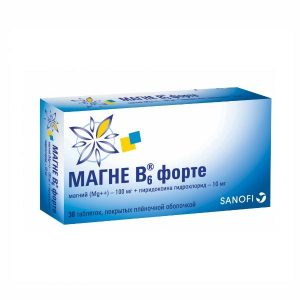Description
Release form
Injection.
Packing
10 pcs.
Pharmacological action
Magnesium sulfate – sedative, antispasmodic.
Pharmacodynamics
When administered parenterally, it has a depressing effect on the central nervous system. Depending on the dose, a sedative, hypnotic or anesthetic effect may be observed. Magnesium sulfate has a depressing effect on neuromuscular transmission. It reduces the excitability of the respiratory center, in large doses with parenteral administration it can cause respiratory paralysis. Lowers blood pressure, incl. in connection with the general calming effect (the effect is more pronounced with hypertension). Magnesium sulfate is excreted by the kidneys, in the process of excretion, diuresis is enhanced.
Magnesium ion antagonists are calcium ions. A decrease in calcium in the blood is accompanied by an increase in the action of magnesium.
Contraindications
hypersensitivity to the drug
AV block
arterial hypotension
conditions, accompanied by calcium deficiency, depression of the respiratory center.
Special instructions
If necessary, simultaneous iv administration of Mg2 + and Ca2 + salts is administered in different veins.
It is possible to use magnesium sulfate to relieve epileptic status (as part of complex therapy).
Patients with severe renal impairment should not receive more than 20 g of magnesium sulfate (81 mmol Mg2 +) within 48 hours, patients with oliguria or severe renal impairment should not receive iv sulfate too quickly. It is recommended to control the concentration of Mg2 + in serum (should be no higher than 0.8-1.2 mmol / l), diuresis (at least 100 ml / 4 h), respiratory rate (at least 16 / min), blood pressure.
For parenteral use, special care should be taken not to create toxic concentrations of the drug. Elderly patients often require a dose reduction (impaired renal function).
Injection may also be used for oral administration (as a laxative).
Composition
Active ingredient: magnesium sulfate.
Dosage and administration of
i / m or iv. Magnesium sulfate is used only as directed by a doctor. Doses are specified taking into account the therapeutic effect and the concentration of magnesium sulfate in the blood serum.
In case of hypertensive crises, they are injected IM or IV slowly, 520 ml of a 25% solution. In convulsive syndrome, spastic conditions, the drug is prescribed IM 520 ml of a 25% solution in combination with anxiolytic drugs with a pronounced central muscle relaxant effect.
In acute poisoning with mercury, arsenic, and tetraethyl lead, 5-10 ml of a 5-10% solution of magnesium sulfate are injected iv.
Side effects
Early signs and symptoms of hypermagnesemia: bradycardia, diplopia, sudden rush of blood to the skin of the face, headache, decreased blood pressure, nausea, shortness of breath, blurred speech, vomiting, asthenia.
Signs of hypermagnesemia, ranked in order of increasing serum Mg2 + concentration: decreased deep tendon reflexes (2-3.5 mmol / L), lengthening the PQ interval and expanding the QRS complex on an ECG (2.5-5 mmol / L), loss of deep tendon reflexes (4-5 mmol / L), inhibition of the respiratory center (5-6.5 mmol / L), impaired cardiac conduction (7.5 mmol / l), cardiac arrest (12.5 mmol / l).
In addition, hyperhidrosis, anxiety, deep sedation, polyuria, uterine atony.
Drug interaction
Enhances the effect of other drugs that inhibit the central nervous system.
Cardiac glycosides increase the risk of impaired conduction and AV block (especially with simultaneous iv administration of Ca2 + salts).
Muscle relaxants and nifedipine enhance neuromuscular blockade.
With the combined use of magnesium sulfate for parenteral administration with other vasodilators, an increase in the hypotensive effect is possible.
Barbiturates, narcotic analgesics, antihypertensive drugs increase the likelihood of inhibition of the respiratory center.
Violates the absorption of antibiotics of the tetracycline group, weakens the effect of streptomycin and tobramycin.
Ca2 + salts reduce the effects of magnesium sulfate.
Pharmaceutically incompatible (precipitates) with preparations of Ca2 +, ethanol (in high concentrations), carbonates, bicarbonates and phosphates of alkali metals, salts of arsenic acid, barium, strontium, clindamycin phosphate, sodium hydrocortisone succinate, polymyxin B sulfate, procaine hydrochloride and tartrates. At Mg2 + concentrations above 10 mmol / ml in mixtures for complete parenteral nutrition, separation of fat emulsions is possible.
Overdose
Symptoms: respiratory depression, depression of the central nervous system, up to the development of anesthesia.
Treatment: as an antidote for an overdose of magnesium sulfate, calcium preparations are used – calcium chloride or calcium gluconate.
Storage conditions
At a temperature not exceeding 30 ° C.
The Expiration of
is 3 years.
lekarstvennaja form
Solution for infusion
Dalkhimpharm, Russia


